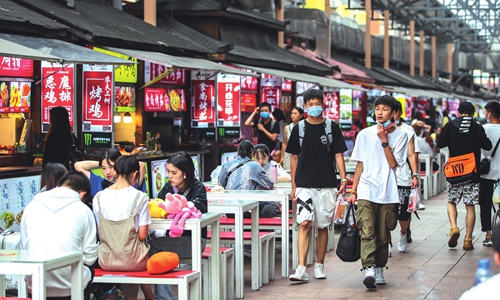China’s H1 retail sales drop 11.4% y-o-y due to consumption constraints amid pandemic
Source: Global Times Published: 2020/7/16 13:58:22

Residents enjoy food at Guiyang, Southwest China's Guizhou Province. China will work to improve the consumption of domestic residents and support the recovery and development of the consumer service sectors, according to a government work report submitted to the national legislature for deliberation. Photo:cnsphoto
China's retail sales of consumer goods declined 11.4 percent year-on-year to 17.23 trillion yuan ($2.47 trillion) in the first half of this year due to sluggish consumption demand amid the COVID-19 pandemic, but online consumption soared against the downward trend.
Excluding automobiles, the retail sales of consumer goods dropped 10.9 percent in the first six months compared with the same period last year, the National Bureau of Statistics (NBS) said on Thursday.
The second quarter saw evident improvement as retail sales declined 3.9 percent year-on-year, with the drop narrowing 15.1 percentage points compared with the first quarter, NBS said, adding June's retail sales were down 1.8 percent year-on-year, narrowing the decline from May.
The statistics showed that China's consumption recovery is still constrained, especially after the epidemic control and prevention work normalizes, some clustering consumption activities or those that require contact have been restricted, NBS spokesperson Liu Aihua told a press conference, referring to the catering industries.
However, online retail sales in China surged in the first half of the year achieving 5.15 trillion yuan - a 7.3-percent-growth year-on-year, up 2.8 percentage points compared with the first five months, thanks to China's prosperous tech and internet-powered economic upgrades amid the coronavirus pandemic.
Specifically, physical commodity online sales reached more than 4.3 trillion yuan, surging by 14.3 percent year-on-year and accounting for a quarter of total retail sales of consumer goods.
"COVID-19 brought tremendous changes to consumption behavior and the pandemic will certainly have many impacts on consumption, not just in the short term, but also in the long term, which means consumption recovery might be slower than we expected," Chen Bo, an associate research fellow at the Institute for Finance and Economics at the Central University of Finance and Economics, told Global Times on Thursday.
He suggested that internet companies should play a bigger role in stimulating the currently sluggish domestic consumption, such as introducing more shopping festivals and releasing shopping vouchers to customers, even though local governments have already issued consumption vouchers to revive one of the major economic drivers in the country.
"Sidelines should also be encouraged at present when some people receive less pay than before the pandemic," Chen suggested, adding he had seen users on video platforms such as Douyin (China's TikTok) and Kuaishou selling goods when livestreaming as a method to increase their income.
Looking further, Liu said that consumption convenience will gradually improve as the epidemic control measures take effect and the supply of consumer goods will also be optimized.
However, it is notable that the personal disposable income per capita across China declined by 1.3 percent in the first half of this year compared with the same period last year, "so it requires more effort to foster spending power in the second half of the year," Liu noted.
In the first two quarters, personal disposable income per capita among residents reached 15,666 yuan, up 2.4 percent nominally year-on-year, but this in fact represents a drop of 1.3 percent after deducting price factors.
Global Times